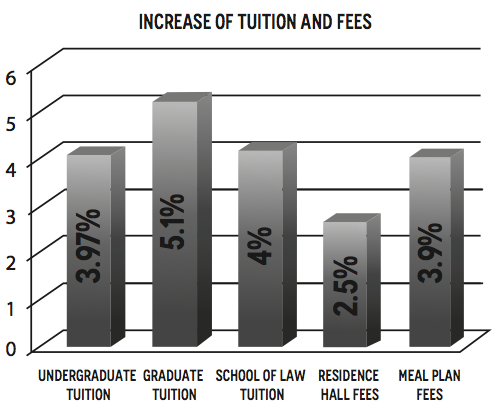On Monday, May 9, Seattle University President Fr. Stephen Sundborg, S.J. sent out a letter detailing the finalized $211.9 million budget for the 2017 fiscal year.
The budget, which increased 3.3 percent from last year, will fund a spectrum of new and
continuing programs.
Seattle U Chief Executive Officer Connie Kanter says that the university identified four major areas that need funding for the upcoming year.
“Academic programs [are] always going to be a priority—that’s who we are. The other priorities that we identified this year were compensation, ERP implementation, and inclusive excellence,” Kanter said.
Increased Student Fees
With the increase in budget comes a rise in fees. Students can expect to see this increase in a couple of areas.
Undergraduate tuition will increase 3.97 percent, graduate tuition will increase from zero to 5.1 percent depending on the program, School of Law tuition will increase 4 percent, residence hall fees will increase 2.5 percent, and meal plan fees will increase 3.9 percent.
“When we set tuition rates for next year, tuition and fees were increasing slightly less than four percent for the second year in a row, and I think that that’s something that we’re particularly sensitive to for students,” Kanter said.
Academic Programs
New academic programs include:
Master of Science in
Business Analytics
Master of Social Work
Programs in the School of New and Continuing Studies
Acute Care Nurse Practitioner
post-graduate certificate
Revised University Honors program
An assistant director will be hired for the International Student Center. Kanter said that the international student population has grown over the last several years, but its support services haven’t kept up with the needs. The new staff member will hopefully fill that gap.
Additional funding will be directed toward Entry and Second-Year Experience, which essentially means first and second year undergraduate programming. The goal of this task force is to ensure the success of those students. Kanter spoke of a new ‘Intro to Seattle U’ type of course that will be offered to incoming students.
The Lemieux Library will also receive additional funding. Some of that funding is for the renewal of subscriptions to academic journals and other library resources. Other funding will be designated toward library renovations which will take place in the next couple of years.
Student Support
The increased budget will fund various student programs including a Deputy Title IX Coordinator, or what Kanter describes as a Title IX Investigator.
Based on the emerging recommendations of the Task Force for Diversity and Inclusive Excellence, the university will establish a chief diversity officer, a diversity council and new resources for faculty and staff.
The university will also hire on a new Disabilities Services Staff Member.
Anna Pickett, junior Humanities for Leadership major, is the President of the Coalition for Students with Disabilities. She said that she sees the additional staff member as a huge victory for students with disabilities.
“One of my biggest hopes with this new position is that we’re able to think more proactively. Incorporating disability into discussions around social justice in a more centered way, in a way that’s more intentional,” Pickett said.
The university intends to hire a full-time KXSU station manager.
Bella Pham is a recent Seattle U graduate and the current Social Media director at KXSU. The radio station had been predominantly student-run until February of this year. Pham said that while she is thankful for funding from the university, she’s not sure if the increased management is necessary.
“We welcome money, we’ve never had any money to give out ever. But along with the money comes management, and that’s something that maybe we’re not used to it, and that’s something that we have to get used to,” Pham said.
REvSU
$1.6 million will be spent on the implementation of the new enterprise resource planning (ERP) system.
“And the ERP system is really the operating backbone system for the university. So all for students, all of their financial aid and tuition and student accounts all goes through there, all of their registration for classes go through it, all the transcript information, so for students, the student module is by far in a way the biggest,” Kanter said.
Compensation$4 million will be allocated toward compensation.
For faculty and staff, that means a 2.5 percent increased wage pool. Faculty and staff will get a wage depending on two factors
“It’s based on a combination of merit and current pay,” Kanter said. Depending on those, Kanter said that most faculty and staff can expect
a pay bump.
To keep up with the increasing minimum wage, $800,000 will be allocated toward student workers, both work-study and non-work-study.
Financial Aid
Finally, with all of the changes, the new budget includes $82.7 million in financial aid, $8.7 million in additional support for non-law students and $250,000 for law students.
Tess may be reached at triski@su-spectator.com








